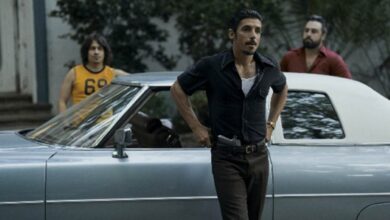Oscars special: ‘Mank’, the latest from David Fincher
Mank leads the nominations at the Oscars, with no less than ten nominations. Here we tell you all about the visionary director's excellent black and white film.

David Fincher’s latest masterpiece and Netflix original production leads the Oscar nominations, with no less than ten nominations. Photo: YT-Netflix
LatinAmerican Post | Gonzalo Schiffer
Listen to this article
Leer en español: Especial Óscars: ‘Mank’, lo último de David Fincher
What is Mank about?
While writing the script for the most iconic film of the great Orson Welles, the controversial and media screenwriter Herman Mankiewicz remembers his journeys and moments of glory in Hollywood during the convulsed 1930s. All those memories full of adventures and comic and dramatic anecdotes will go away with him serving as the scriptwriter as inspiration to script the script for the historic film Citizen Kane.
Personal criticism of a cult work
Anyone who is fascinated by the history of cinema and appreciates that golden age of Hollywood, will enjoy the tribute and exemplary period adaptation of good black and white cinema, which turns out to be Netflix's Mank, under the supervision of the established director and always visionary. David Fincher. Beyond the myths and discussions that revolve around the authorship of the story in the emblematic and transcendental film that Citizen Kane meant, Mank is also a portrait of the political context, where strong cracks coexist between communism, capitalism, conservatism, liberalism, and socialism.
Also read: Oscars Special: "The Mole Agent" a raw portrait of loneliness
Gary Oldman's portrayal as Herman Mankiewicz is worthy of an Oscar and justifies his nomination for best actor. His character goes through moments of lucidity and grace, with a speech that does not hide anything, very harsh and acid, with absolute sincerity, and also with many contradictions. The film represents very well the shadows under which the scriptwriters are sometimes left, as they are underestimated and exploited to the limit, so that later the recognition of the public is purely for the director, and as I mentioned earlier, we are talking outside the fight which is generated by the legend that Citizen Kane represents.
The film internalizes the altercations between the screenwriter Mankiewicz and important producers and businessmen and exposes the ego and pride of the representative figure of that decade, Orson Welles. It is very funny to see how this "mediatic" scriptwriter is building the script of a film that was filled with praise and represented a before and after in the film industry.
Recall that in addition to the nominations for best film and best actor, Mank also has the following eight nominations:
- Best Director for David Fincher
- Best Supporting Actress for the Role of Amanda Seyfried
- Best Direction of Photography
- Best makeup and hairstyle
- Best Costume Design
- Best Production Design
- Best soundtrack
- Best sound design
All these nominations are very understandable, starting with David Fincher's nomination, the director once again narrates with style and great audiovisual quality all the events that take place in the film. Many situations have a comic and even media circus tone, there is a lot of criticism from the director of the luxury and arrogance of Hollywood, and a very particular look on Orson Welles that probably annoys some extremist fans.
Amanda Seyfried plays a very important role in the film, a kind of muse within the American film industry, and a clear reflection of the meaning of female stardom in those times. Regarding her performance as an actress, the nomination is understandable, the young woman handles the expressions and emotions very well, of a desired and important woman within the Hollywood field.
Regarding the items that help the adaptation of the time, such as production design, makeup, and hairstyle, clearly, there was behind a very serious and deep research work, to portray and evoke with the greatest possible fidelity all the sets, costumes, and appearances physics from that particular movie era. The costumes and locations used are admirable, with an atmosphere that highlights all that excessive ambition of producers and at the same time highlights very well the decadence of the most important studios.
As for the nomination for best photography, it would be an injustice not to win the award. There is a remarkable work by the director of photography Erik Messerschmidt to set us in dark and gloomy lighting at times, lucidly and talentedly recreating the tense climate of Hollywood, immersed in a conflict of the writers' guild, between dismissals of actors and closure of studies.
Finally, the sound work as a whole gives the film a lot of freshness and rhythm and also provides those amounts of humor that the film has, alternating between different musical styles.





